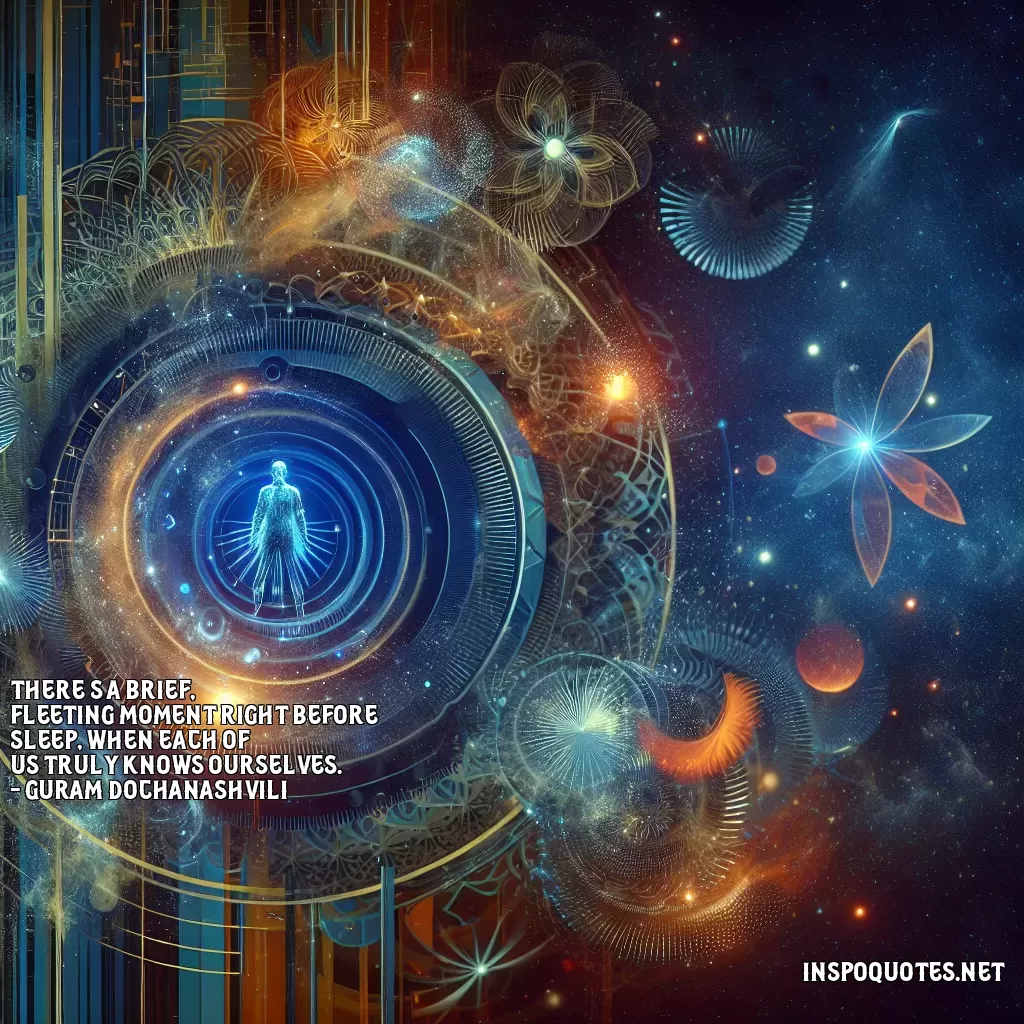
There’s a brief, fleeting moment right before sleep, when each of us truly knows ourselves. - Guram Dochanashvili
Author: Guram Dochanashvili
👁️ 6 views

There’s a brief, fleeting moment right before sleep, when each of us truly knows ourselves. - Guram Dochanashvili
👁️ 6 views
The quote by Guram Dochanashvili, "There’s a brief, fleeting moment right before sleep, when each of us truly knows ourselves," speaks to the introspective experiences that occur during the transition from wakefulness to sleep. This interval, often described as the hypnagogic state, is characterized by a unique blend of consciousness, where the mind, unfettered by the day's distractions and responsibilities, can come face-to-face with the essence of oneself. During this fleeting moment, the layers of daily personas and defense mechanisms we build up throughout our waking hours start to peel away. Without the external pressures of social roles, work, or the expectations imposed by society, individuals are left with their unfiltered thoughts and emotions. This state fosters a clarity and honesty that is sometimes difficult to achieve during the busyness of daily life. The concept of "knowing oneself" goes beyond just being aware of one’s thoughts; it encompasses an understanding of one's true desires, fears, dreams, and vulnerabilities. As we lie in bed, teetering on the edge of consciousness, our subconscious mind’s influence becomes more pronounced, allowing these deeper aspects of our personality to surface. This moment of self-awareness is transitory and disappears as quickly as it comes, making it a precious opportunity for introspection and self-discovery. Dochanashvili’s quote captures the ethereal quality of this experience, highlighting its rarity and the profound truth it can reveal. By acknowledging its existence, one might strive to seize these moments, using them as opportunities to foster personal growth and a deeper understanding of oneself.
Quote By: Guram Dochanashvili
**Guram Dochanashvili: A Contemporary Georgian Literary Voice**
Guram Dochanashvili, born in Tbilisi, Georgia in 1939, is a prominent figure in Georgian literature and has made significant contributions to the cultural landscape of his homeland. Renowned for his unique narrative style and deep exploration of human emotions, Dochanashvili's works resonate with readers both in Georgia and internationally. His journey as a writer has been marked by an unwavering commitment to portraying the complexities of life in a society undergoing transformation.
After completing his education at Tbilisi State University, Guram Dochanashvili began his career as a journalist, which honed his skills in observation and storytelling. His early experiences influenced his literary style, incorporating elements of realism interwoven with rich allegorical themes. The socio-political landscape of Georgia, particularly during the Soviet era, profoundly shaped Dochanashvili’s writing, giving him a vivid context against which he could explore the human condition.
Dochanashvili's breakthrough came with his novel "The Tbilisi Underground," published in the 1970s. This work not only garnered critical acclaim but also established him as a leading voice in Georgian literature. His ability to delve into the psyche of his characters while simultaneously reflecting the broader societal issues is a hallmark of his style. Throughout his career, Guram Dochanashvili has published numerous novels, short stories, and essays, each imbued with his characteristic blend of humor, tragedy, and philosophical inquiry.
In addition to his literary accomplishments, Guram Dochanashvili has played an active role in promoting Georgian literature and culture. He has participated in various literary festivals and has been involved in teaching and mentoring young writers, ensuring the continuity of Georgia's rich literary heritage. His contributions extend beyond the written word; Dochanashvili has become a symbol of resilience and creativity in a country that has seen significant upheaval.
Guram Dochanashvili continues to write and inspire, proving that literature can serve as a powerful medium for understanding our shared humanity. As he reflects on the past while looking toward the future, his work remains a crucial part of the literary canon, resonating with readers who seek both solace and challenge in his profound narratives.